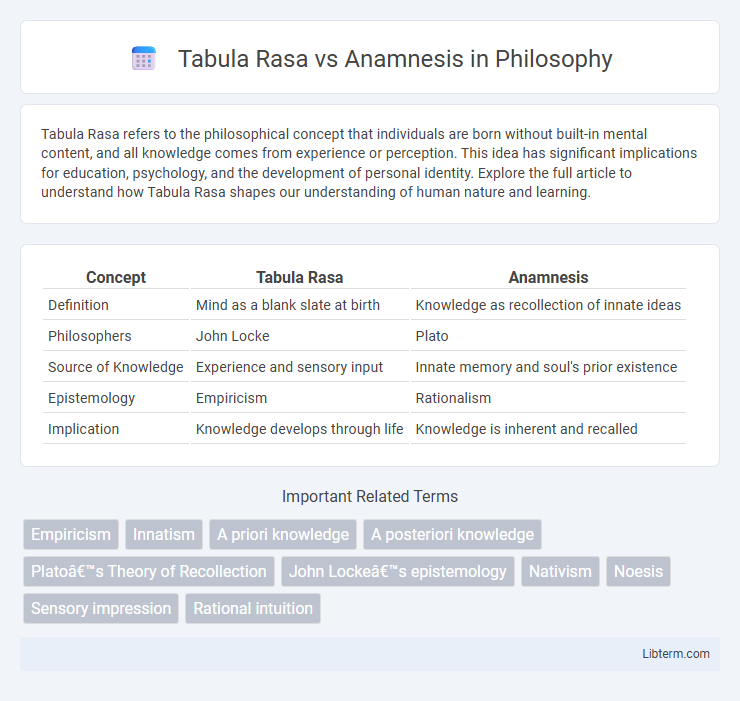Tabula Rasa refers to the philosophical concept that individuals are born without built-in mental content, and all knowledge comes from experience or perception. This idea has significant implications for education, psychology, and the development of personal identity. Explore the full article to understand how Tabula Rasa shapes our understanding of human nature and learning.
Table of Comparison
| Concept | Tabula Rasa | Anamnesis |
|---|---|---|
| Definition | Mind as a blank slate at birth | Knowledge as recollection of innate ideas |
| Philosophers | John Locke | Plato |
| Source of Knowledge | Experience and sensory input | Innate memory and soul's prior existence |
| Epistemology | Empiricism | Rationalism |
| Implication | Knowledge develops through life | Knowledge is inherent and recalled |
Introduction to Tabula Rasa and Anamnesis
Tabula Rasa refers to the philosophical concept that the human mind starts as a blank slate, emphasizing knowledge acquisition through experience and sensory input. Anamnesis, rooted in Platonic thought, suggests that learning is a process of recollecting innate knowledge pre-existing within the soul prior to birth. These contrasting views highlight fundamental debates in epistemology regarding the origins of knowledge and cognition.
Historical Origins of Tabula Rasa
The concept of Tabula Rasa, originating from ancient philosophy and notably articulated by John Locke in the 17th century, posits the mind as a blank slate shaped entirely by experience and sensory input. This theory contrasts with Anamnesis, which traces back to Plato's doctrine of recollection, suggesting knowledge is innate and remembered from past incarnations. The historical origins of Tabula Rasa emphasize empiricism, influencing modern psychology and education by highlighting the role of environmental factors in cognitive development.
Philosophical Foundations of Anamnesis
Anamnesis, rooted in Plato's theory of recollection, posits that knowledge is innate and learning is a process of remembering truths pre-existing within the soul. This contrasts with Tabula Rasa, which argues the mind begins as a blank slate, shaped entirely by experience and sensory input. The philosophical foundation of Anamnesis emphasizes the soul's immortality and prior existence, suggesting that genuine knowledge transcends empirical observation and arises from introspection and innate memory.
Key Thinkers: Locke vs Plato
John Locke's Tabula Rasa theory emphasizes the mind as a blank slate, shaped entirely by sensory experience and empirical evidence, advocating for knowledge through observation and learning. In contrast, Plato's concept of Anamnesis asserts that knowledge is innate, and learning is the process of recollecting pre-existing truths from the soul's prior existence. Locke's empiricism challenges Plato's rationalism by prioritizing external experience over inherent ideas.
Comparative Analysis: Nature vs Nurture
Tabula Rasa posits that the human mind begins as a blank slate, emphasizing environmental influence and learning in shaping behavior, while Anamnesis asserts that knowledge is innate and recovered through recollection, highlighting inherent qualities. Comparative analysis reveals Tabula Rasa aligns with nurture-centric theories, prioritizing experience and sensory input, whereas Anamnesis supports a nature-oriented perspective, underscoring preexisting cognitive structures. This dichotomy frames ongoing debates in psychology and philosophy regarding the origins of knowledge and personality development.
Cognitive Development and Human Learning
Tabula Rasa posits the mind as a blank slate at birth, emphasizing that cognitive development and human learning primarily result from sensory experiences and environmental interactions. Anamnesis suggests innate knowledge or memory within the soul, implying that learning involves recollecting pre-existing information rather than acquiring it anew. These contrasting theories influence educational approaches, with Tabula Rasa promoting experiential learning and Anamnesis underscoring the activation of inherent cognitive structures.
Modern Interpretations in Psychology
Modern interpretations in psychology distinguish Tabula Rasa as the theory that individuals are born without innate mental content, emphasizing environmental influence and learning in cognitive development. Anamnesis contrasts this by positing that knowledge and experiences are innate or recollected from previous existence, informing present consciousness. Contemporary debates integrate neuroplasticity and genetic predispositions, acknowledging interplay between innate structures and experiential factors in shaping human behavior and cognition.
Impacts on Education and Teaching
Tabula Rasa theory, emphasizing a blank slate at birth, promotes educational approaches centered on experience-based learning and environmental influence, enabling personalized teaching strategies that cater to individual student backgrounds. In contrast, Anamnesis, rooted in the idea of innate knowledge and recollection, supports curricula designed to activate pre-existing cognitive structures, encouraging methods like Socratic questioning to uncover latent understanding. Understanding the balance between these theories impacts the development of effective pedagogies, assessment designs, and cognitive skill enhancement in educational systems.
Criticisms and Debates in Contemporary Thought
Criticisms of Tabula Rasa center on its underestimation of innate cognitive structures and genetic influences, challenging the notion that the mind starts as a blank slate. Debates in contemporary thought contrast Anamnesis, emphasizing recollection of innate knowledge, with empirical evidence supporting neuroplasticity and experience-driven learning. Scholars argue the discourse between Tabula Rasa and Anamnesis highlights the complex interplay between nature and nurture in human cognition.
Conclusion: Reconciling Tabula Rasa and Anamnesis
Reconciling Tabula Rasa and Anamnesis involves recognizing that human knowledge acquisition encompasses both innate potential and experiential learning. Cognitive science highlights that while the mind starts with a baseline neural architecture, interaction with the environment activates latent knowledge structures. This synthesis underscores that understanding human cognition requires integrating the principles of both blank-slate and pre-existing memory theories.
Tabula Rasa Infographic

 libterm.com
libterm.com